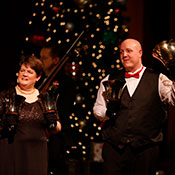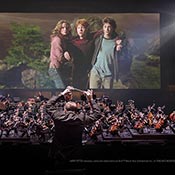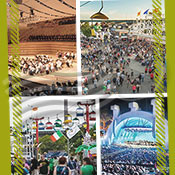
One great big long choreographed event: Making holiday music
David Lewellen
PUBLISHED
Tagged Under: 2017.18 Season, Around Town, Pops, Special Presentation
In the month of December, the Milwaukee Symphony Orchestra will present 23 performances in nine different venues. How does that happen?
“It’s one great big long choreographed event,” said production stage manager Amy Langenecker.
“It’s a lot of little pieces that have to fit together,” said librarian Patrick McGinn.
“It’s a challenge to be organized enough to pull it off,” said personnel manager Linda Unkefer.
December is a busy month for any arts group, but the MSO’s logistical challenge begins with limited access to its home base in Uihlein Hall — only the first weekend of the month, for its popular Holiday Pops concert. After that, the orchestra hits the road to perform Handel’s Messiah in local churches, to present holiday classics in nearby communities, and to perform movie soundtracks at the Riverside Theater.
“Split week,” as the orchestra calls it, is an extra challenge. That’s when some musicians, along with the Milwaukee Symphony Chorus, are presenting Messiah around town, while their colleagues are performing Harry Potter and the Chamber of Secrets at the Riverside.
Personnel manager is a full-time job in the MSO, but Unkefer’s assistant, Rip Prétat, also plays in the bass section. During split week, Prétat will be handling personnel at the Harry Potter concerts while Unkefer travels to the Messiah venues. Although Messiah calls for only a small orchestra of 30 players or so, “a John Williams score takes a lot of strings and brass and winds,” Unkefer said, “and it takes a lot of advance planning to get subs hired.”
That is the secret of how the Milwaukee Symphony can be in two places at once. Substitute and extra musicians, who may be seen in almost any week of the orchestra’s season, are hired in much larger numbers to meet the demands of December. Like full-timers, substitute musicians must pass a behind-the-screen audition to be added to the call list, proving that “you’re a good musician but just haven’t had the good fortune to win a national audition,” Unkefer said.
“We have a pool of substitutes who are highly qualified to work with us,” Unkefer said. But December is often the busiest month of the year for a freelance musician, so she begins making calls in July to set her lineups for every concert.
If a musician plays the concert in West Bend on Dec. 5 and has to miss the same program in Brillion on Dec. 6, not only does Unkefer have to find a substitute — McGinn has to make sure the new musician has copies of the right music, long enough in advance to practice. The librarian’s job, too, gets extra complicated during the holiday season.
The Milwaukee Symphony owns full scores and parts to about 2,000 works of music, including most of the holiday standards, but others have to be rented — mostly works currently under copyright protection. McGinn makes sure that the right parts are in the musicians’ slots backstage, or on the stand at the first rehearsal — or, for substitutes, mailed to them weeks or months beforehand. For an extra-popular piece like Leroy Anderson’s “Sleigh Ride,” which will be played by slightly different groups of musicians on different concert series, the MSO keeps two sets of parts available.
During split week, McGinn will be at the Riverside Theater looking after the rented score and parts to Harry Potter and the Chamber of Secrets. “Messiah is a known quantity,” he explained, “but this is the first time we’re doing this particular movie.”
But at least that’s one thick book of music per musician. For the holiday pops concert, the orchestra might play 18 selections. “That’s a lot of pieces to keep track of, instead of tossing in a Beethoven Nine and being done with it,” McGinn joked.
For everything else that he does, McGinn at least does not have to throw music into the back seat of his car. All parts go into a rolling wooden trunk, which is loaded onto the truck that also transports chairs, stands, percussion equipment, basses, a podium, and more. And that truck is the particular domain of Langenecker. In a normal week, she makes sure that the orchestra is set up correctly for Uihlein Hall, but nothing in December is normal — she is thinking about nine different stages, nine different loading docks, and packing two or three different trucks.
Everything is filed in her mind. “At the Basilica, we could use the wide risers for the chorus, the 16-foot ones,” she said. “But St. John’s Cathedral is too narrow. There, we have to use the 12-foot risers.” But during Messiah week, she can’t unload and reload the truck from one day to the next; the chorus will have to squeeze in the Basilica, too.
Venues that hardly ever host an orchestra have unique challenges, like the loading dock at the VA hospital, the “crazy matrix of buildings” at Children’s Hospital of Wisconsin, and the cement columns in the St. Ann multipurpose room that impede sight lines. But, she said, “Those are my favorite venues, because the audiences for those concerts are just delightful.”
The MSO transports chairs to every venue, and many musicians have their own personal chairs. “There’s about one and a half racks’ worth of personal chairs,” Langenecker said, “but if enough of those people are on vacation or sick, I start thinking that maybe I can fit them on one, and if I can save a rack, then I have room for the harp. That’s the puzzle.”



